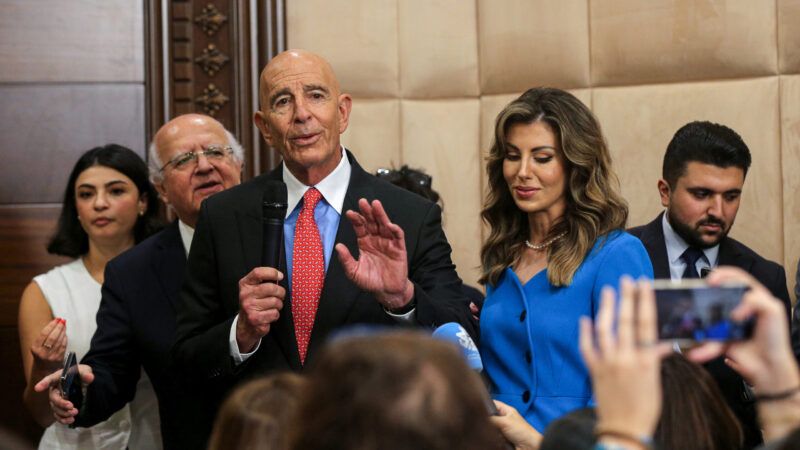U.S. Plan To Disarm Hezbollah Is a Diplomatic Dead End
Washington’s proposal to link Israeli withdrawals with Hezbollah’s surrender ignores decades of political entrenchment and risks fueling wider conflict.

The United States has given Lebanon until the end of the year to disarm Hezbollah in exchange for ending Israeli military operations there. This proposal, delivered to President Joseph Aoun, offers incremental Israeli withdrawals over the next few months in return for Hezbollah's gradual dissolution—an outcome that's nearly impossible in practice and already rejected by the group. Washington's attempt to link Israeli withdrawals to Hezbollah's disarmament ignores military and political realities. Disarming the terrorist group is not a matter of transactional diplomacy, but a near-impossible task that risks wasting diplomatic capital while the greater Middle East sinks deeper into instability.
Deputy Special Envoy to the Middle East Morgan Ortagus and U.S. Ambassador to Turkey Tom Barrack delivered the offer, which outlines an Israeli concession of five border points in cooperation with the Lebanese military. Ideal as it sounds, the Iran-backed group has had its teeth sunk into Lebanese civil, political, and even military sectors for decades, and it is the first watershed moment for the legitimacy of Aoun's new administration. A former army chief, Aoun countered with a point-for-point trade that Israel has since rejected, given the terrorist group's outright refusal to disarm.
The Lebanese Army still presented the disarmament plan, which won cabinet approval in early September despite Shiite ministers walking out in protest—but it still sidesteps the core problem: Disarmament cannot be bargained with a terrorist organization that's already embedded in the political and military state.
In fact, the same Shiite cabinet members who walked out during the discussion were members of Hezbollah's Loyalty to the Resistance Bloc party, the allied Shiite Amal party, and one independent Shiite minister. Simultaneously a foreign terrorist organization and a political party, Hezbollah is a "state within a state," with deep-seated influence in the Lebanese government that has blocked legislative business and influenced elections.
Two possible outcomes could have resulted from the deal: Aoun could attempt to disarm Hezbollah and risk another civil war, or the government could stall and prompt Israeli Prime Minister Benjamin Netanyahu to intervene militarily.
Given Israel's strike in Qatar against Hamas leadership earlier this week, the latter was more probable. Any hope for the former was lost last week when Ortagus visited Lebanon alongside U.S. Army commanders, indicating clearly that the U.S. is lending strategic expertise to help the Lebanese Army execute the plan. Israel has already begun its campaign against Hezbollah sites in northeast Lebanon. Additionally, Israel recently refocused its military personnel and hardware to their two-pronged effort in Gaza and Lebanon, backed by American shipments of military aid as well.
America's role in this deal undermines its credibility, and Barrack's ignorant remarks to Lebanon's press have only worsened perceptions. Using our diplomatic capital to implement failing military plans wastes resources that could be used to build bridges. Rather than feeding endless wars that will likely destabilize the region further, the U.S. ought to prioritize effective negotiations. Washington should focus on realistic goals—reducing tensions, supporting an uncorrupted Lebanese government, and containing Hezbollah—rather than delegating an impossible task that sets its recipient up to fail.


Show Comments (20)